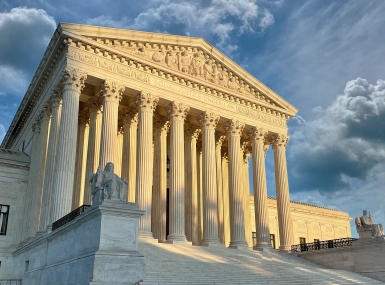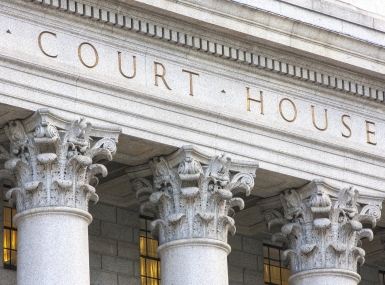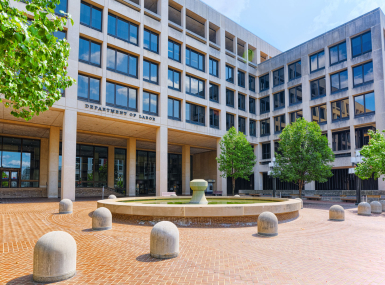U.S. Supreme Court decision halts Purdue Pharma opioid settlement
Author
Upcoming Events
Related News

Key Takeaways
On June 27, the U.S. Supreme Court issued a 5-4 ruling in Harrington v. Purdue Pharma, a case centering on a controversial provision shielding the Sackler family (who own Purdue Pharma, the maker of OxyContin) from civil lawsuits as part of their $6 billion opioid settlement agreement. Though the Court’s decision may expose the Sacklers to potential future financial liability for their role in fueling opioid crisis, it also upends the hard-fought deal requiring the Sacklers to pay up to $6 billion over 18 years toward victims as well as state, tribal and local governments, most of whom voted to approve the bankruptcy plan.
Hundreds of county governments are represented among the claimants expecting an imminent release of funds under the Purdue Pharma settlement agreement. With the liability shield for the Sackler family struck down, negotiations must now proceed without that provision, which many saw as a key incentive for their agreement to a $6 billion payout. The fate of these critical resources to help county governments address the devastating aftermath of the opioid epidemic is now uncertain.
The Purdue Pharma Settlement Agreement
- In 2019, facing thousands of claims related its role in fueling the nationwide opioid epidemic due to the manufacturing and aggressive marketing of OxyContin, Purdue Pharma filed for bankruptcy.
- Bankruptcy proceedings led to a reorganization plan establishing trusts available for victim compensation funded by assets of the Purdue bankruptcy estate. Critically, the Sackler family negotiated an agreement to contribute up to $6 billion to those trusts in exchange immunity from all current and future opioid lawsuits. The plan was approved by over 95 percent of the voting opioid claimants, though some objected
Legal Challenge
- A group of dissenters quickly challenged the legality of the agreement on the grounds that U.S. laws surrounding bankruptcy cannot be used to shield the Sackler family from future liability because they had not personally filed for bankruptcy. Lower courts have generally been split on this legal question.
- The agreement was thrown out in district court, but ultimately overturned in an appeal in June 2023. In July 2023, the U.S. Trustee, functioning in its oversight role over the bankruptcy process, then petitioned the Supreme Court to stay the Second Circuit’s ruling and hear the case.
- In a 5-4 decision written by Justice Neil M. Gorsuch, the majority held that bankruptcy law does not permit protecting the Sackler family from being sued. The decision has implications not just for the agreement at hand but other bankruptcy settlements involving claims of mass injury, as the liability shield has become a popular incentive in those negotiations.
Implications for Counties
- State, local and tribal governments have negotiated a series of opioid settlements with various drug companies, totaling more than $50 billion overall. However, the Purdue Pharma settlement would have ranked among the largest and was only the second so far to include direct payments to victims.
- With the deal struck down by the Supreme Court, Purdue and the claimants must now return to the negotiating table, which both parties have expressed willingness to do. However, without the promise of a liability shield, it is uncertain how much funding the company will be willing to commit to families and communities. Meanwhile, another delay means ongoing legal fees which continue to consume potential payouts to those impacted.
- County governments across the country who were slated to receive funds under the Purdue Pharma settlement agreement now face uncertainty and further delays in accessing these critical resources
NACo will continue to monitor the Purdue Pharma litigation and bankruptcy negotiations.
2024-2025 Supreme Court Term

NACo Legal Advocacy: Ames v. Ohio Department of Youth Services
As one of the largest employers in the country, counties have a significant interest in cases like Ames v. Ohio Department of Youth Services (Ames v. Ohio) that could expand county liabilities as employers.

NACo Legal Advocacy: City of Buffalo et al. v. Kia/Hyundai
The question at hand in City of Seattle et al. v. Kia/Hyundai is whether or not the Federal Motor Vehicle Safety Standard preempts state tort claims brought forth by local governments alleging that Kia and Hyundai’s failure to install “reasonable” anti-theft technology constitutes negligence and public nuisance.

NACo Legal Advocacy: Perttu v. Richards
Perttu v. Richards has implications on the Prison Litigation Reform Act (PLRA) and could increase the amount of Section 1983 inmate-initiated cases against county jails that reach federal court, ultimately resulting in counties having to expend resources on frivolous lawsuits.

NACo Legal Advocacy: McLaughlin Chiropractic Associates, Inc. V. McKesson Corporation
McLaughlin Chiropractic Associates, Inc. V. McKesson Corporation could make it more difficult for counties to challenge FCC orders, many of which have taken steps to preempt and curtail local authority by limiting counties’ abilities to manage their own right of way and assess fair market value permitting and impact fees on providers seeking to construct, modify or extend telecommunications infrastructure in their communities.

NACo Legal Advocacy: San Francisco v. Environmental Protection Agency (EPA)
San Francisco v. Environmental Protection Agency (EPA) has implications for the ability of county governments that own and operate wastewater treatment facilities to comply with National Pollutant Discharge Elimination System (NPDES) permit requirements.

NACo Legal Advocacy: Lackey v. Stinnie
Lackey v. Stinnie will impact the ability of state and local governments to avoid paying litigation fees in a civil rights case if they change their conduct (i.e. repeal a law) after a court has granted a preliminary injunction.

NACo Legal Advocacy: Bondi v. VanDerStok
Garland v. VanDerStok has implications for the ability of county law enforcement to uphold public safety and investigate crimes involving ghost guns.

NACo Legal Advocacy: Stanley v. City of Sanford
Stanley v. City of Sanford will impact the ability of county governments to balance budgets by reducing or eliminating post-employment benefits for disability retirees.

NACo Legal Advocacy: EMD Sales, Inc. v. Carrera
EMD Sales, Inc. v. Carrera could make it more difficult for county governments to prove exemptions under the Fair Labor Standards Act (FLSA), which would increase the potential for costly litigation.

NACo Legal Advocacy: Federal Communications Commission, et al v. Consumers' Research, et al
Federal Communications Commission, et al v. Consumers’ Research, et al. (FCC v. Consumers’ Research) could jeopardize what is known as the Universal Service Fund (USF). Through the USF, the FCC has provided billions of dollars to local governments and our residents, helping provide essential telecommunications and broadband services to unserved and underserved communities. FCC v. Consumers’ Research challenges the FCC’s legal authority behind the USF, putting multiple programs essential to equitable broadband deployment at risk.
Related News

County Countdown – Dec. 15, 2025
Every other week, NACo's County Countdown reviews top federal policy advocacy items with an eye towards counties and the intergovernmental partnership.

County officials moonlight in search and rescue roles
For some county officials, participating in search and rescue operations is another way to serve their communities, and make it safer for people to enjoy natural recreation resources.
Featured Initiative
Opioid Solutions Center
NACo's Opioid Solutions Center empowers local leaders to invest resources in effective treatment, recovery, prevention and harm reduction practices that save lives and address the underlying causes of substance use disorder.


